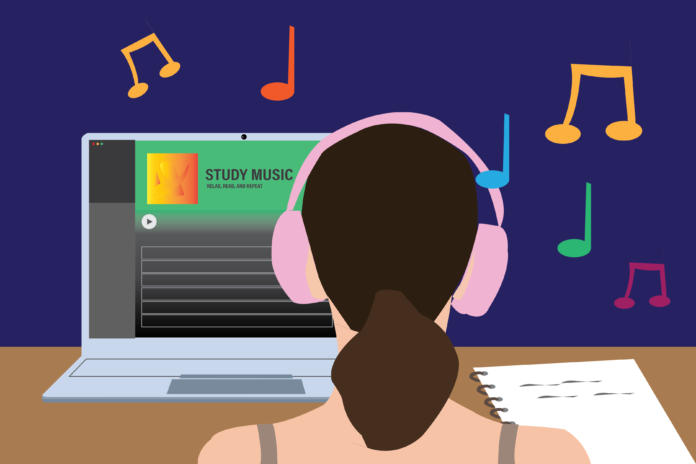UC Davis students weigh in on their study music preferences
By CORALIE LOON — arts@theaggie.org
It isn’t uncommon for students to pop in some headphones and listen to a favorite Spotify playlist when in need of some extra motivation. Music can be a fun way to help make studying more interesting and make the hours feel like they’re speeding by. But does listening to music while studying actually improve productivity? And if so, what’s the secret?
I sent out an anonymous survey through both text messages and an Instagram story to UC Davis students and of the 15 respondents, the majority (about 90%) reported listening to music while studying either “always,” “often” or “sometimes,” with “always” being the top response. While listening to music is a popular study habit, not everyone agrees that it helps productivity.
Nova Tambke, a first-year computer science major, sometimes listens to music when studying but finds it distracting for reading.
“If I want to maximize my productivity, no music would probably be best,” Tambke said.
In fact, when asked about listening habits while reading, the number of students who responded to the survey with never listening to music jumped to around 70%. A few studies have shown that listening to music lowers reading comprehension and might harm the retention of information, a slightly discouraging finding for study-music lovers.
However, reading a difficult passage in a textbook is only one type of studying. When it comes to non-reading forms of studying, music shows more promise in helping productivity and focus.
One well-circulated theory dubbed the “Mozart Effect” argues that listening to classical music is the superior way to go and that it can even boost intelligence and cognitive abilities. However, despite its continuous reappearance in online media, it has been debunked.
In reality, any benefits classical music might have on productivity probably have more to do with its lack of lyrics and relaxing effect (which anyone who has listened to “Flight of the Bumblebee” knows is not an intrinsic quality).
Genevieve Hasslen, a third-year neurobiology, physiology and behavior major who is trained in classical ballet, understands the benefits of classical music.
“Listening to classical ballet music and different concertos and sorts helps me relax and take deep breaths,” Hasslen said. “I typically will do that, the classical music, if I’m needing to read or it’s something that I need to put a little bit more analysis into.”
But while being “relaxed” may help focus to a certain extent, is it really the right mindset for studying? The fact that many students turn to coffee to alleviate productivity slumps, a stimulant that can increase anxiety, argues for a different perspective.
When asked about what music helps her feel the most productive, Hasslen’s preference was a Lofi hip hop playlist she listens to on YouTube.
“It’s weird, every beat almost keeps me accountable, keeps me going,” Hasslen said. “It’s nice listening to it.”
“Lofi,” which a Forbes article describes as an “instrumental blend of traditional hip-hop and jazz,” is arguably one of the most popular study music choices.
In the same survey of UC Davis students’ listening preferences, the top responses to the question “What type of music makes you feel the most productive?” were “upbeat music” and “instrumental music.” Coincidentally, lofi hip hop might be the perfect combination of the two, combining relaxing instrumentation with more motivational electronic beats.
Those who find lofi to be an effective studying genre may even want to try out video game music, which is designed to be stimulating without being distracting, two traits that study music benefits from, and has been shown to help with focus and efficiency.
Of course, there are many options of music to study to, and some students seem to have no problem listening to traditional pop or rap while grinding. However, the overarching theme seems to be that wordless yet stimulating music is the key to a rewarding study session.
Of course, a quiet environment can be just as helpful, if not more helpful, for memory retention. But in a public setting, silence can be hard to come by, and music can be a slightly more entertaining version of white noise.
“[Music] doesn’t make me more productive than if I just didn’t have any music,” said Megan Midkiff, a first-year sociology major. “It just makes me focus a bit better when there’s distracting noises.”
Both study habits and music habits are deeply personal preferences that vary according to the individual. In the end, the bottom line for study music is: do what works for you, but keep an open mind. Who knows, the Super Mario Bros soundtrack may just be what gets you through your next essay.
Written by: Coralie Loon — arts@theaggie.org






